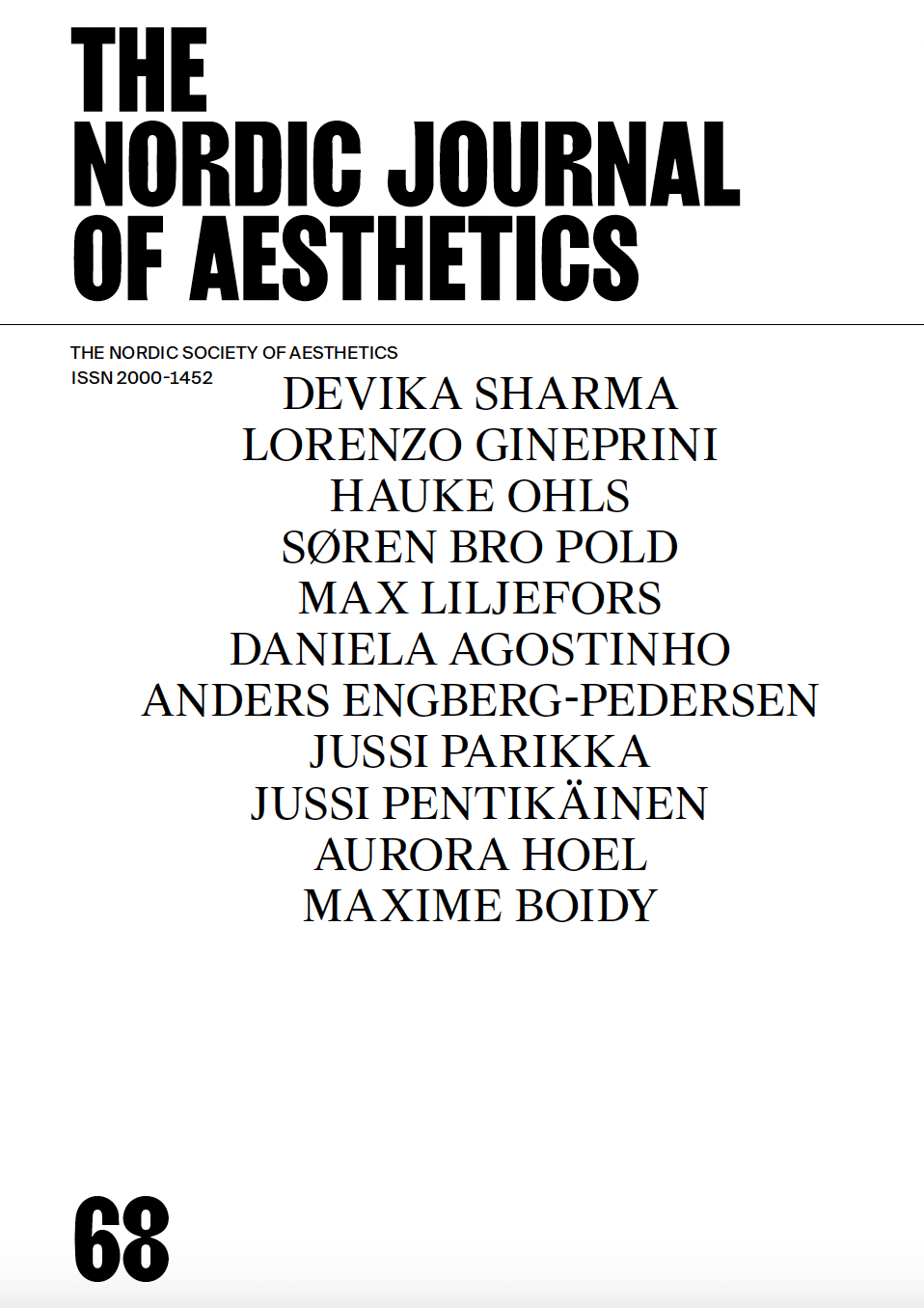Skeptimentality: The Square and the Aesthetics of Complicity
DOI:
https://doi.org/10.7146/nja.v33i68.152362Keywords:
Privilege, Sentimentality, Moral Sentiments, Östlund, The SquareAbstract
In this article, I offer the notion of “skeptimentality” as a framework for thinking about the strikingly transmuted character of the noble moral sentiments (sympathy, empathy, benevolence, compassion, care, and pity) in the privilege-sensitive public culture of contemporary Scandinavia. Skeptimentality is my term for the sense that there is something morally embarrassing about the moral sentiments. I bring into play insights from feminist studies of sentimental sympathy as mediating factor in gender, race, and class-relations in order to highlight the extent to which skeptimentality differs from sentimentality and the aesthetic of sympathy we associate with it. The latter part of the essay develops further the notion of skeptimentality through an analysis of Swedish director Ruben Östlund’s award-winning feature film The Square (2017). As an aesthetic mode, skeptimentality has its own tropes, which often take an explicitly critical position on sentimental ones; it is, I submit, an aesthetic not of sympathy, but of complicity.
References
Baldwin, James. "Everybody’s Protest Novel." In Notes of a Native Son, 31–45. New York: The Dial Press, 1963 [1949].
Berggren, Henrik, and Lars Trägårdh. The Swedish Theory of Love: Individualism and Social Trust in Modern Sweden. Translated by Stephen Donovan. Seattle: University of Washington Press, 2022.
Berlant, Lauren. The Female Complaint: The Unfinished Business of Sentimentality in American Culture. Durham: Duke University Press, 2008.
Bjørkdahl, Kristian, and Antoine de Bengy Puyvalléee, eds. Do-Gooders at the End of Aid: Scandinavian Humanitarianism in the Twenty-First Century. Cambridge: Cambridge University Press, 2021.
Esping-Andersen, Gøsta. The Three Worlds of Welfare Capitalism. Cambridge: Polity Press, 1995.
Ezra, Elizabeth. “Out of Bounds: The Spatial Politics of Civility in The Square (Östlund, 2017) and Happy End (Haneke, 2017).” Northern Lights 18 (2020): 107–121.
Festa, Lynn. Sentimental Figures of Empire in Eighteenth-Century Britain and France. Baltimore: Johns Hopkins University Press, 2006.
Freeman, Elizabeth. Beside You in Time. Durham: Duke University Press, 2019.
Gilroy, Paul, and Ruth Wilson Gilmore. "Transcript: In Conversation with Ruth Wilson Gilmore." UCL, Sara Parker Remond Centre Podcast, June 7, 2020. https://www.ucl.ac.uk/racismracialisation/transcript-conversation-ruth-wilson-gilmore.
Grønstad, Asbjørn. “Conditional Vulnerability in the Films of Ruben Östlund.” In Vulnerability in Scandinavian Art and Culture, edited by Adriana Margareta Dancus, Mats Hyvönen, and Maria Karlsson, 19–33. London: Palgrave Macmillan, 2020.
Hammann, Kirsten. En dråbe i havet. Copenhagen: Gyldendal, 2008.
Hendler, Glenn. Public Sentiments: Structures of Feeling in Nineteenth-Century American Literature. Chapel Hill and London: The University of North Carolina Press, 2001.
Jensen, Christina Nordvang. "I Ghana hedder det ’Orboni Wawu’: Den døde, hvide mands tøj. Og der kommer stadig mere af det." Information, April 17, 2023. https://www.information.dk/udland/2023/04/ghana-hedder-obroni-wawu-doede-hvide-mands-toejkommer-stadig-mere.
Krarup, Søren. “Søren Krarup svarer læserne.” Religion.dk, February 2, 2005. Archived at https://web.archive.org/web/20210304141751/https://www.religion.dk/sp%C3%B8rg-om-kristendom/sren-krarup-svarer-lserne.
Ngai, Sianne. Ugly Feelings. Cambridge and London: Harvard University Press, 2005.
Rancière, Jacques. The Emancipated Spectator. Translated by Gregory Elliott. London and New York: Verso, 2011.
Sandemose, Axel. En flyktning krysser sitt spor (A Fugitive Crosses His Tracks). Copenhagen: Gyldendal, 1933.
Sandvik, Siv. “Frp-Listhaug: – Godhetstyranniet rir Norge som en mare.” NRK, November 3, 2015. https://www.nrk.no/norge/frp-listhaug_-_-godhetstyranniet-rirnorge-som-en-mare-1.12633044.
Schuller, Kyla. The Biopolitics of Feeling: Race, Sex, and Science in the Nineteenth Century. Durham: Duke University Press, 2018.
Sharma, Devika. "Doing Good, Feeling Bad: Humanitarian Emotion in Crisis." Journal of Aesthetics & Culture 9, no. 1 (2017). DOI:10.1080/20004214.2017.1331373.
———. "Privileged, Hypocritical, and Complicit: Contemporary Scandinavian Literature and the Egalitarian Imagination." Comparative Literature Studies 56, no. 4 (2019): 711–730.
———. "Skandimentalitet. Moral og amoral i skandinavisk privilegiesensibilitet og i The Square." K&K 132 (2021).
———. "The Predicament of Spectatorship: Renzo Martens and the Humanitarian Image." In Discursive Framings of Human Rights: Negotiating Agency and Victimhood, edited by Karen-Margrethe Simonsen and Jonas R. Kjærgård, 113–132. Abingdon and New York: Birkbeck Law Press, 2017.
Solomon, Robert C. In Defense of Sentimentality. New York and Oxford: Oxford University Press, 2004. DOI:10.1093/019514550X.001.0001.
Tvedt, Terje. Verdensbilder og selvbilder. En humanitær stormakts intellektuelle historie. Oslo: Universitetsforlaget, 2002.
Östlund, Ruben. The Square. Director and writer. Göteborg: Plattform Produktion, 2017.
Downloads
Published
How to Cite
Issue
Section
License
Copyright (c) 2024 Devika Sharma

This work is licensed under a Creative Commons Attribution 4.0 International License.
Authors who publish with this journal agree to the following terms:
- Authors retain copyright and grant the journal right of first publication with the work simultaneously licensed under a Creative Commons Attribution License that allows others to share the work with an acknowledgement of the work's authorship and initial publication in this journal.
- Authors are able to enter into separate, additional contractual arrangements for the non-exclusive distribution of the journal's published version of the work (e.g., post it to an institutional repository or publish it in a book), with an acknowledgement of its initial publication in this journal.
- Authors are permitted and encouraged to post their work online (e.g., in institutional repositories or on their website) prior to and during the submission process, as it can lead to productive exchanges, as well as earlier and greater citation of published work (See The Effect of Open Access).




